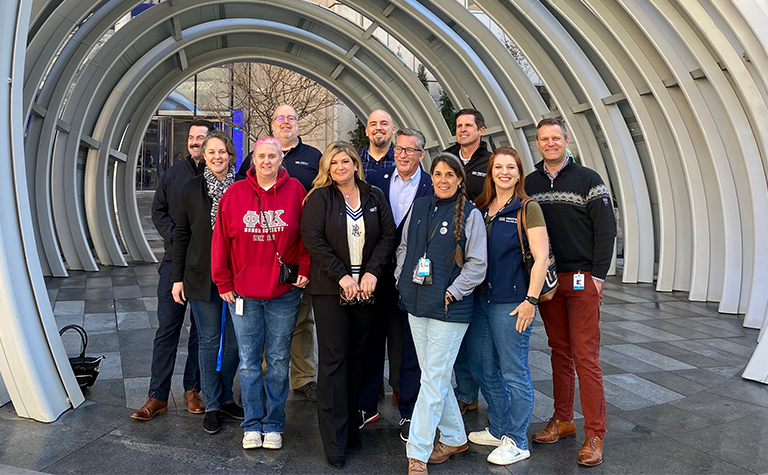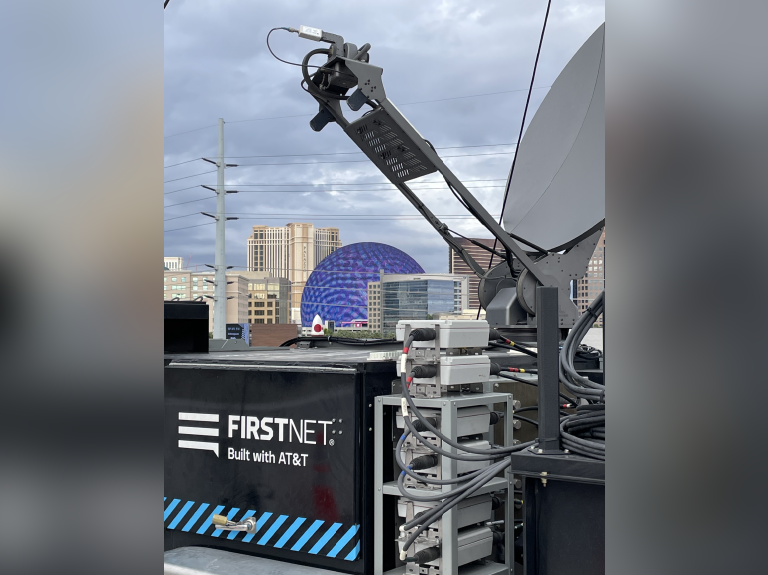One of AT&T’s core values is to Be There when people need us. And with FirstNet®, that’s exactly what we do. Where public safety goes, we go. It’s given us an upfront view of what it truly means when our first responders “run toward the danger.” In these situations, people can see things, smell things, hear things, and touch things that most people never experience in a “normal” day. And those experiences can take time and a support system to heal.
The FirstNet team has become a critical component in disaster response and our colleagues can often face similar stressors as those on the frontlines. Inspired by our work with first responders through the FirstNet Health and Wellness Coalition, we recently launched our own peer support program that trained a select group of employees to act as peer support ambassadors to their colleagues on teams like the FirstNet Response Operations Group (ROG), AT&T Network Disaster Recovery (NDR), Field Operations and more. Deployed to disaster sites to help first responders and their communities stay connected when it matters most, these employees may encounter situations that require them to observe events that have the potential to gradually wear down their overall wellness.

FirstNet employees were trained on how to support their colleagues and offer resources to those in need.
A peer can be the crucial lifeline that ensures our colleagues get the resources they need to thrive. Our peer support ambassadors will provide emotional support to those who have been deployed on behalf of FirstNet, Built with AT&T and the first responders we serve. They will promote trust, allow anonymity and listen, assess and refer their peers – and their families – to professionals as needed. Led by Optum and R3 Continuum, our peer support training program is creating a better environment for our employees that will, ultimately, improve self-esteem, decision making and social functioning, as well as decrease stress and lower rates of isolation.
By bridging the gap between an individual and potential available resources, peer support programs allow trained personnel to speak about stresses on the job and at home in a structured setting while providing a level of safety and guidance to those who may be struggling.
“As a company that specializes in making reliable connections happen every day, it is so uplifting to see the dedication to, and support around, the creation of a Health and Wellness team,” said Nollie “Edmon” Jones, FirstNet Client Solutions Executive and new FirstNet Peer Support Ambassador at AT&T. “During the training, I was challenged to reflect on personal and shared experiences, encouraged to grow in my understanding of the peer support model, and embedded into a team of loving, courageous and forward-thinking leaders.”
Peer Support for First Responders
The FirstNet Health and Wellness Coalition has been working with organizations to train first responders on peer support initiatives since its inception. And we have seen the impact that formal peer support trainings can have on the mental health of a first responder. From helping others process traumatic events to supporting colleagues with personal stressors, peer support programs can help first responders – and those who support their missions – find new ways to look at their past experiences and future prospects.
After all, we understand how our first responder community is struggling and recognize a peer can also be the crucial lifeline that ensures first responders get the resources they need to thrive in a volatile and chaotic career:
- An estimated 20-25% of all first responders report experiencing post-traumatic stress1; and depression, PTSD, burnout and anxiety are common themes discussed among the emergency responder community2.
- 44.4% of polices officers have reported that most first responders would not seek professional help when appropriate3, a theme that many emergency responders would find familiar.
Between the stressors of increasing operational tempo, the complexity of calls, family and home-life needs, public safety professionals are feeling the squeeze. By opening up conversations with their fellow first responders on how they are doing and what they need, peer support can help reduce that perceived stigma and bring about actionable change.
We are proud to support our first responders with their mental health needs and are excited that we can connect people to greater possibility by continuing that mission with our own team. By learning how we can be there for our coworkers, we can help create a better place to work, start a better mental health journey and better support those on the frontlines.
To learn more, visit FirstNet Health and Wellness Coalition.
HTML Editor Component
*Contents may not have visible height
Read more Public Sector & FirstNet news



